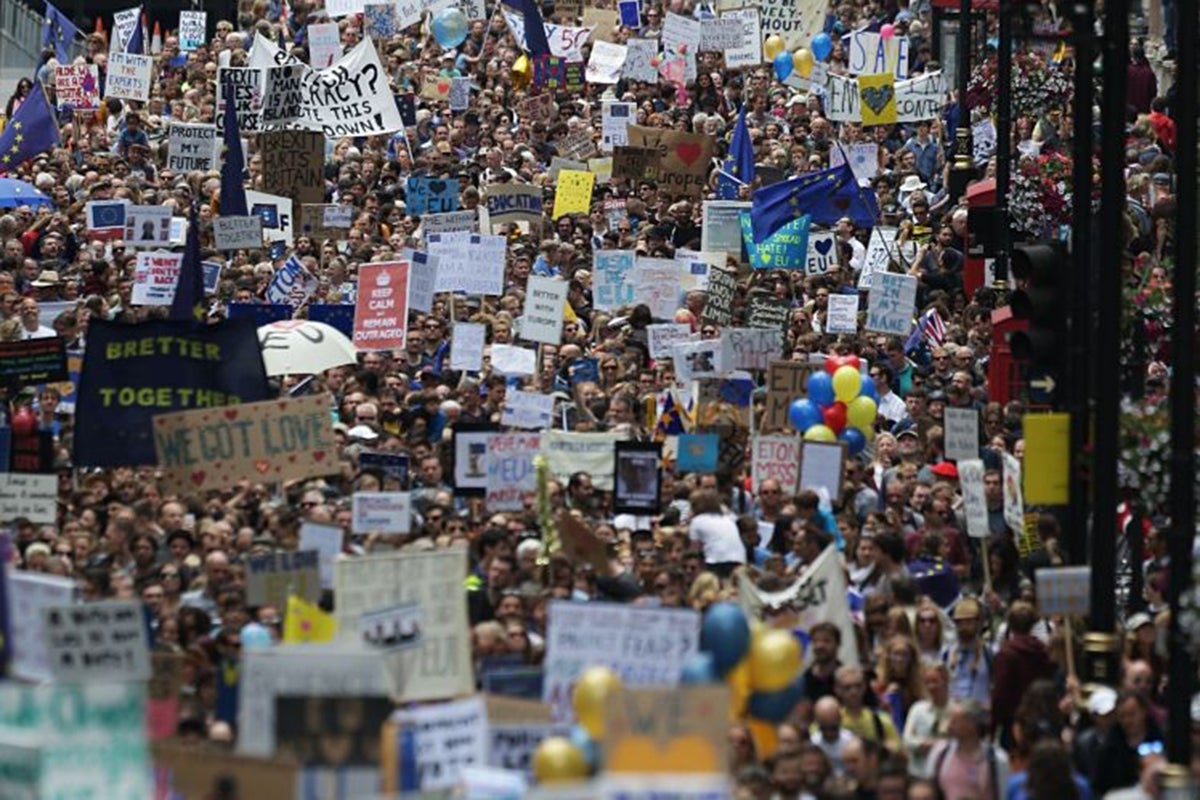Don't panic. Britain's economy can survive just fine outside the European Union
A former senior International Monetary Fund economist examines the deep social and economic forces that drove the Brexit vote - and offers some reassurance for the future

Your support helps us to tell the story
From reproductive rights to climate change to Big Tech, The Independent is on the ground when the story is developing. Whether it's investigating the financials of Elon Musk's pro-Trump PAC or producing our latest documentary, 'The A Word', which shines a light on the American women fighting for reproductive rights, we know how important it is to parse out the facts from the messaging.
At such a critical moment in US history, we need reporters on the ground. Your donation allows us to keep sending journalists to speak to both sides of the story.
The Independent is trusted by Americans across the entire political spectrum. And unlike many other quality news outlets, we choose not to lock Americans out of our reporting and analysis with paywalls. We believe quality journalism should be available to everyone, paid for by those who can afford it.
Your support makes all the difference.Two unrelated historical processes met at Brexit.
The European Union, inspired by great wisdom and empathy, had fulfilled its historical mission. That mission was primarily to secure peace in a continent weary of its own ferocity and then to establish open borders to cement the peace and spread prosperity. And that task was largely done by the early 1990s, when the essential framework for open borders was in place.
As the historian Tony Judt said, “a parenthesis in European history began to close.”
The other historical force was a gradual decline in global productivity growth in the last half-century. Northwestern University scholar Robert Gordon has documented that economic dividends from the great innovations of the late-19th century ran out by the 1970s, with nothing comparable to replace them. Economic cleavages emerged as those with access to education and financial backing managed successfully, while others could not keep pace.
The privileged group was well-positioned to harness the power of globalization as it gathered momentum beginning in the late-1980s, while those who were poorly educated and disconnected from the nodes of prosperity were left behind. Globalization was not the culprit, but it became a symbol of their discontent.
Brexit arrived at this crossroads. Not surprisingly, Brexit was favored by the least educated. Brexit supporters also are geographically isolated. As in many parts of Europe, that separation is creating two different economies.
The European Union’s benefits are not evident in these marginalized economies and Brexit had a resonance there.
All Europe had to offer Brexiters was more trade within Europe and better trade deals with the rest of the world. But these are precisely the flash points of anxiety and stress for those who voted “Leave.”
Obama's naive mistake
In a moment of astonishing political misjudgment, U.S. President Barack Obama sealed this tie between “Remain” and future trade treaties.
A Britain out of the European Union, he said, would “go back to the end of the queue” on the treaties that America expects to sign, while Europe would get priority.
Obama’s threat was economically misguided and politically naïve. Who was he speaking for? For heaven’s sake, Hillary Clinton, the presumptive Presidential nominee of the Democratic Party, opposes trade treaties.
Even if we step back from the concerns of those excluded from the benefits of globalization, the value of trade deals being negotiated is highly questionable. Instead of opening borders and leveling the playing field, every initiative is now an opportunity for some interest group to gain economic advantage.
It is not a coincidence that lobbyists have proliferated alongside trade negotiations. And because trade negotiations are based on economic-power relationships, they gradually encroach into sovereign economic management. Tax regimes, labor laws and social security systems are being shaped by these pressures. This is not just a political minefield; fitting diverse nations into one economic template does not make economic sense.
The European Union was not the principal reason why many felt economically and politically powerless, but its bureaucratic creep became a potent symbol of the overpowering force of globalization.
Values not economics
The outgoing Prime Minister of Britain David Cameron, who likes to think of himself as modern-day Winston Churchill, had little understanding of these historical forces. Indeed, even Churchill had his historical blind spots. He petulantly called Gandhi a “half-naked fakir” and vehemently opposed Indian independence.
But Cameron, seeking his petty political victories, was largely clueless about the larger stakes he ended up playing for. Tactical gains can lead to strategic advance only when guided by a larger vision. All Cameron wanted was greater hold over his party.
But once he let the genie out of the bottle, Cameron misjudged again by making an economic case for remaining in the European Union rather than attempting a serious political argument for Europe—one based on shared values.
Perhaps there was no political argument to be made, but the effort to present an economic calculus for a political decision was bound to backfire. The economic numbers to make the case for Britain remaining in Europe were fanciful, however many economists and international organizations joined to endorse them.
Following Brexit, productive British trade with the European Union will survive just fine wherever it is based on long-lasting economic gains and social relationships. At the same time, the shift toward trade with the faster-growing United States and Asia will continue. Between 2000 and 2014, the share of British exports to Europe fell from 60 to 45 percent.
Almost all new British trade is being created outside of Europe. The new tougher trade regime could even spur productivity growth. As the British economy inevitably disengages from Europe, empathy for European Union will decline further. A referendum five years from now will produce an even clearer decision to say out.

Thus, the Cameron government’s placards displaying “£4300”—to warn the public that they would be permanently poorer by that amount—was economic nonsense and misreading of historical trends.
When the intimidating numbers of long-term economic damage failed to create a stir, frenzied warnings of financial mayhem were trotted out. These warnings threatened to become all too real, not because there was a fundamental economic basis for them, but because officials created a self-fulfilling narrative of panic. More financial market volatility may yet come, but there is no reason it will be long lasting.
Europe's own interest to make things work
The simplest way to form an economic prognosis is to ask: what are the incentives that influence the principal actors? The answer: it is in everyone’s interest to make things work. German Finance Minister Wolfgang Schäuble’s bluster—echoed by many European leaders—that Britain would be “punished” for wanting to leave the European Union made no sense.
Why? Because even after Brexit, German exporters do not want to lose access to Britain. Short-sighted score-settling will disrupt an economically fragile Europe Not for the first time German Chancellor Angela Merkel has squashed the silly talk. Investors will begin to see their way through the basic contours of a new framework.
Of course, it is possible that Britain will lose some of its financial sector business, although even that is not a sure thing. The power of agglomeration benefits could outweigh regulatory disadvantages. But if finance does become less dominant and property prices fall, why would that not be a good outcome?
Britain has always been at the edge of Europe and, not surprisingly, has led the way in questioning the value of the European Union. Others are bound to follow, and the regulatory and financial outreach of the European Union is bound to decline. As that happens, the real conflict will be felt within the eurozone, and the dangers arising from that have been brilliantly described by columnist and writer Wolfgang Munchau in his daily Eurointelligence commentary.
The Brexit vote caused financial markets to hammer the stocks of European banks, exposing once again the euro area’s fault line running through Italian public debt and Italy’s banks. The problem is simple: since joining the euro in 1999, Italy has virtually not grown.
But debts have accumulated, and someone has to bear the inevitable losses. Any expectation that Europeans will step up to prevent an earthquake through greater political cohesion and financial transfers would be another misreading of history.
As Britain steps out of what can only become a messier Europe, the greatest challenge lies ahead for those who led the “Leave” campaign. They leveraged emotional notions of sovereignty and ugly xenophobic nationalism to make their case. They used these baser appeals to break the dyke in which Cameron created a hole.
And while their self-serving instinct on the role of Europe in Britain is right, they have shown no understanding that the Brexit vote is a clamor for leadership response to the power of globalization. Those who led the Brexit campaign should be looking for clues from the campaign of U.S. Democratic presidential aspirant Bernie Sanders. The task is to build community-based infrastructure to renew a sense of optimism.
Austerity was the mistake
Ultimately, the Cameron government’s fundamental failure began much earlier. It lay in the mindless pursuit of fiscal austerity at a time when interest rates were so low and the need for the next generation of education services and infrastructure was so pressing. Brexit has jarringly rung the alarm bells that politicians have chosen to ignore.
The real tragedy would for Britain would be if—having pulled out of a fading and brittle Europe—new leadership proves even more inept than past leaders at delivering on the true demands of those who voted for Brexit. If the new leaders do not recognize their historical task, the forces of democracy will continue to churn in search of those who can rise to the challenge of these times.
Ashoka Mody is Visiting Professor of International Economic Policy at Princeton University and former deputy director of the International Monetary Fund's European and Research Departments
Join our commenting forum
Join thought-provoking conversations, follow other Independent readers and see their replies
Comments